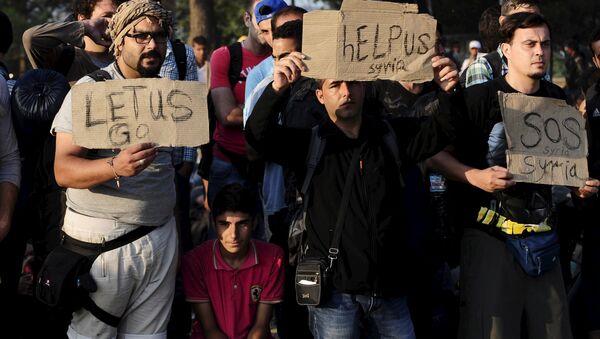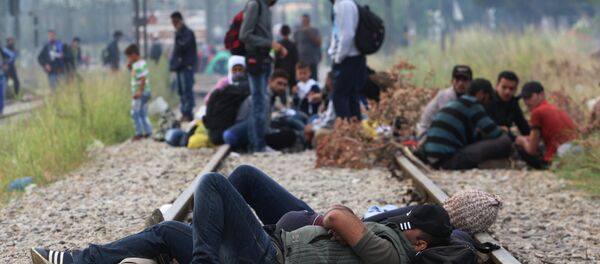Human rights groups have slammed the approach taken by Macedonian officials after riot police, despite being separated by barbed wire, used tear gas and stun grenades on groups of migrants queuing at the country's border with Greece.
Skopje declared a state of emergency in reaction to the influx of migrants passing through the country, with many people hoping to travel from Greece, through Macedonia and onto other northern European countries.
Although, the use of tear gas and stun grenades may not be in place elsewhere, the heavy-handed approach taken by the authorities is something used throughout Europe to combat the migrant crisis.
New security fences at Calais 'won't stop us', say migrants. @danieljerivers reports http://t.co/smllFJzCaN pic.twitter.com/vVYkEU7Eys
— ITV News (@itvnews) August 20, 2015
At Calais in France, British officials have bulked up security and pledged more resources to try and stop people from making the trip across the English channel to the UK.
While Hungary has also made moves to prevent the illegal crossing of asylum seekers with the construction of a fence to protect the country's borders from those entering from Serbia, which is a non-EU country.
Not Addressing the Problem
Why are the headlines about the waves of migrants on EU's borders and not how we destroyed the countries they all come from?
— Simon Varwell (@simonvarwell) August 21, 2015
Despite officials in the UK and other countries claiming that their tough approach to migrants is working, others have suggested that is not addressing the root of Europe's migrant crisis and is merely shifting the problems elsewhere.
This comes amid revelations that Sweden's largest port of Gothenberg is becoming a haven for migrants hoping to reach Britain.
While all eyes are on #Calais, migrants are reaching UK on cargo ships from Sweden. http://t.co/G1P64DPTT5 #göteborg pic.twitter.com/4E6DmjbSlj
— The Local Sweden (@TheLocalSweden) August 20, 2015
Port authorities have warned that they have found rising number people hiding aboard cargo ships and in the port, in the hope of making the risky voyage to the UK.
The port's security chief Thomas Fransson told Swedish newswire TT that there are serious concerns over the safety of stowaways.
"They are taking big risks, we are afraid that someone will die," he said.
"It's a very big problem, we are not prepared for this."
These revelations have added to the criticism of the tough approach applied by some European countries, with critics arguing that blocking migrants from crossing certain borders only shifts the problems elsewhere, and doesn't stem the desire for people to come to Europe in the search of a better life.
Short-sighted politicians. As Calais becomes securer, the tide turns elsewhere. Dunkirk, Holland and now… http://t.co/eeTZXqSkfa
— TraditionalBritain (@TradBritGroup) August 21, 2015
A Problem for the EU
Critics of the EU's immigration policy have blamed Brussels for the increase in number of people making so-called illegal journeys to Europe, arguing that a lack of legal avenues has seemingly forced people to resort to desperate measures in their quest to flee poverty-stricken or war-torn countries.
Mind your language. The EU's 'migrant crisis' is better understood as a failure of the political class.
— Jeff Crisp (@JFCrisp) August 21, 2015
Many say that this approach has led to more people risking their lives to reach Europe, and has in fact facilitated the growth in people smuggling operations due to the overwhelming demand from people hoping to enter Europe.
What exactly has #HomeSecretary signed that differs from the mandate that @Europol_EU already has regarding people smuggling? @Number10press
— Andrew (@Hippo_Rugby) August 20, 2015
Additionally, while the response of non-EU countries like Macedonia has been heavily criticized, many have agued that the crisis is essentially a result of EU policy, with migrants hoping to travel to wealthier northern European countries after arriving in Greece.
Time for the EU to give back that Nobel Peace Prize? #Macedonia http://t.co/kFQbRq8d4n pic.twitter.com/mNczYYU0TJ
— EuropeanAlternatives (@EuroAlter) August 21, 2015
While many migrants make it through to northern Europe, many others are left stranded in non-EU countries like Macedonia and Serbia, adding extra pressure to both asylum seekers and the countries that in many cases are unable to handle the influx of people.



